1. Early Life and Football Beginnings
Bobby Moore's journey into professional football began in his childhood in Barking, where he quickly distinguished himself, leading to his enrollment in West Ham United's youth program.
1.1. Childhood and Youth Career

Moore was born in Upney Hospital in Barking, Essex, on 12 April 1941, the son of Robert E. Moore and Doris (née Buckle). He attended Westbury Primary School in Barking and later Tom Hood School in Leytonstone, playing football for both institutions. In 1956, Moore joined West Ham United's youth academy. He also played cricket for the Essex youth team alongside his future West Ham teammate, Geoff Hurst. At international youth level, Moore represented the England national youth team, reaching the UEFA Youth Tournament final in 1958, where they also won the British Amateur Youth Championship. He and Geoff Hurst were part of the West Ham team that lost the 1959 FA Youth Cup final to Blackburn Rovers (1-2 on aggregate), but they later won the Southern Junior Floodlit Cup, defeating Chelsea 1-0.
1.2. Professional Debut and Early Club Career
Moore made his professional debut for West Ham United on 8 September 1958, against Manchester United, wearing the number six shirt. He effectively replaced his mentor, Malcolm Allison, who was sidelined with tuberculosis. Moore's consistent form soon established him as a regular player. He was highly admired for his composed style as a central defender, particularly his exceptional ability to read the game and anticipate opposition movements. This defensive intelligence set him apart from the common image of hard-tackling, high-jumping defenders. While his heading ability and pace were considered average, his unparalleled game-reading, leadership on the field, and precise timing of tackles distinguished him as world-class. In the 1962 FIFA World Cup quarter-final, England was defeated by eventual winners Brazil (3-1), with Garrincha scoring two goals and Vavá adding another. Moore was only sent off once during his West Ham career, for a foul on Dave Wagstaffe in the final moments of a match against Manchester City in November 1961; the dismissal only became apparent after the game as red cards were not yet issued.
2. Club Career
Bobby Moore's distinguished club career was predominantly defined by his long and impactful tenure at West Ham United, followed by a notable period with Fulham FC and brief spells in overseas leagues.
2.1. West Ham United
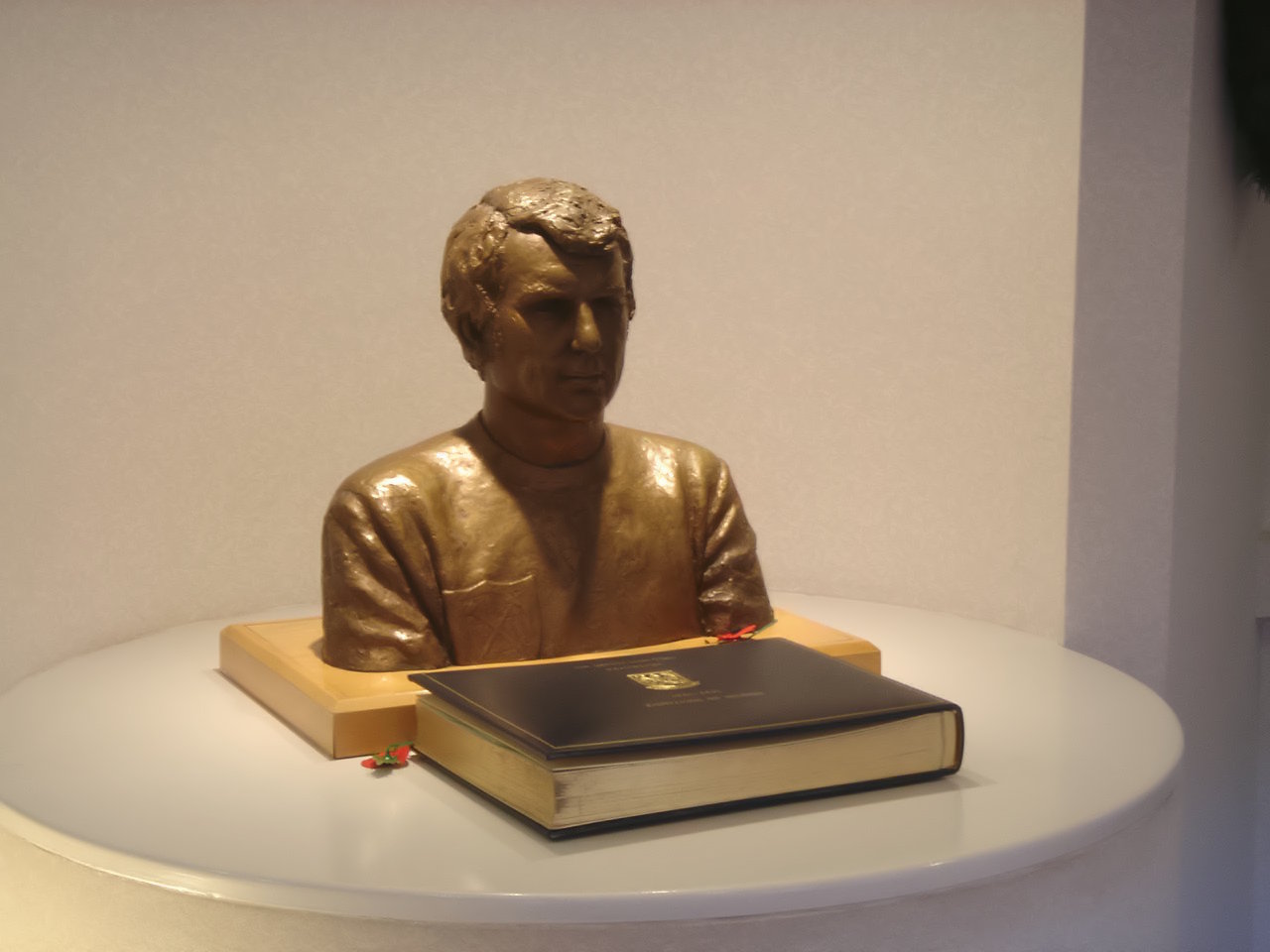
Moore spent 16 years at West Ham United, making over 600 appearances for the club. He became the club's captain and led them to significant triumphs. In 1964, he lifted the FA Cup after West Ham defeated Preston North End 3-2 in the final at Wembley, with Ronnie Boyce scoring the winning goal in the final minute. The following year, 1965, he captained West Ham to victory in the UEFA Cup Winners' Cup, defeating 1860 Munich 2-0 in the final with goals from Alan Sealey. This period marked a golden era for the club under Moore's leadership.
On a personal front, 1964 was also the year Moore was successfully treated for testicular cancer, and he was named the Football Writers' Association Footballer of the Year. In March 1966, he captained West Ham to the final of the Football League Cup, which they lost 5-3 on aggregate to West Bromwich Albion, despite Moore scoring in the first leg. Before the 1966 World Cup, Moore's contract dispute with West Ham almost jeopardized his ability to captain England, but the intervention of England manager Alf Ramsey and West Ham manager Ron Greenwood led to his re-signing. In 1970, he received a testimonial match against Celtic in recognition of his service. However, his career was not without incident; in January 1971, Moore and three teammates were fined a week's wages by manager Greenwood for an early-morning drinking outing before an FA Cup match against Blackpool, which West Ham lost 4-0. This incident coincided with a television feature on Moore for This Is Your Life.
In 1973, Moore surpassed West Ham's appearance record, playing his 509th game for the club, a record later broken by Billy Bonds. His final game for West Ham was an FA Cup tie against Hereford United in January 1974, where he sustained an injury. On 14 March 1974, after more than 15 years, Moore left West Ham, holding the club record for appearances and the most international caps for an outfield player. Fifteen years after his death, in August 2008, West Ham United officially retired his number 6 shirt as a mark of ultimate respect.
2.2. Fulham and Later Career
After leaving West Ham United, Moore joined London rivals Fulham, who were in the Second Division, for 25.00 K GBP. In his first season with Fulham, they defeated West Ham in a League Cup tie and remarkably reached the FA Cup Final, where they again faced West Ham. However, Fulham lost the match 2-0, marking Moore's final appearance at Wembley as a professional player.
Moore played his last professional game in England for Fulham on 14 May 1977, against Blackburn Rovers. He then ventured into the North American Soccer League (NASL), playing for San Antonio Thunder in 1976 (24 games, 1 goal) and Seattle Sounders in 1978 (7 games). In 1976, he also made a final international appearance for Team USA in the 1976 U.S.A. Bicentennial Cup Tournament against teams like Italy, Brazil, and an England side. In April 1978, he signed professionally with Danish side Herning Fremad to promote the professionalization of Danish football, playing 9 games before retiring. He briefly joined Canadian side Edmonton Black Gold in May 1978 for an exhibition schedule and in 1979 played for the Highgate-based club Cracovia during a tour of Malaysia. In 1983, Moore appeared in 8 games for the now-defunct Carolina Lightnin', stepping in due to injuries to the club's roster. John Mitchell, his teammate at Fulham, remarked that even towards the end of his career, Moore was the "world's greatest defender" due to his superior game intelligence, stating, "He could hardly run, couldn't turn, couldn't head a ball, and had no left foot. But he had a better head on his shoulders than any of the others."
3. International Career
Bobby Moore's international career was defined by his captaincy of the England national team, culminating in their historic 1966 FIFA World Cup victory.
3.1. Early International Matches and Captaincy
Moore's impressive form for West Ham and his impact on the team led to his call-up to the England Under-23 squad in 1960. His consistent performances earned him a late call-up to the full England squad in 1962, as preparations were underway for the World Cup finals in Chile. Although uncapped when he flew to South America, Moore made his debut on 20 May 1962 in England's final pre-tournament friendly, a 4-0 victory over Peru in Lima. His performance, alongside fellow debutant Maurice Norman, was so impressive that they remained in the team throughout England's World Cup campaign, which ended with a defeat by eventual winners Brazil in the quarter-finals.
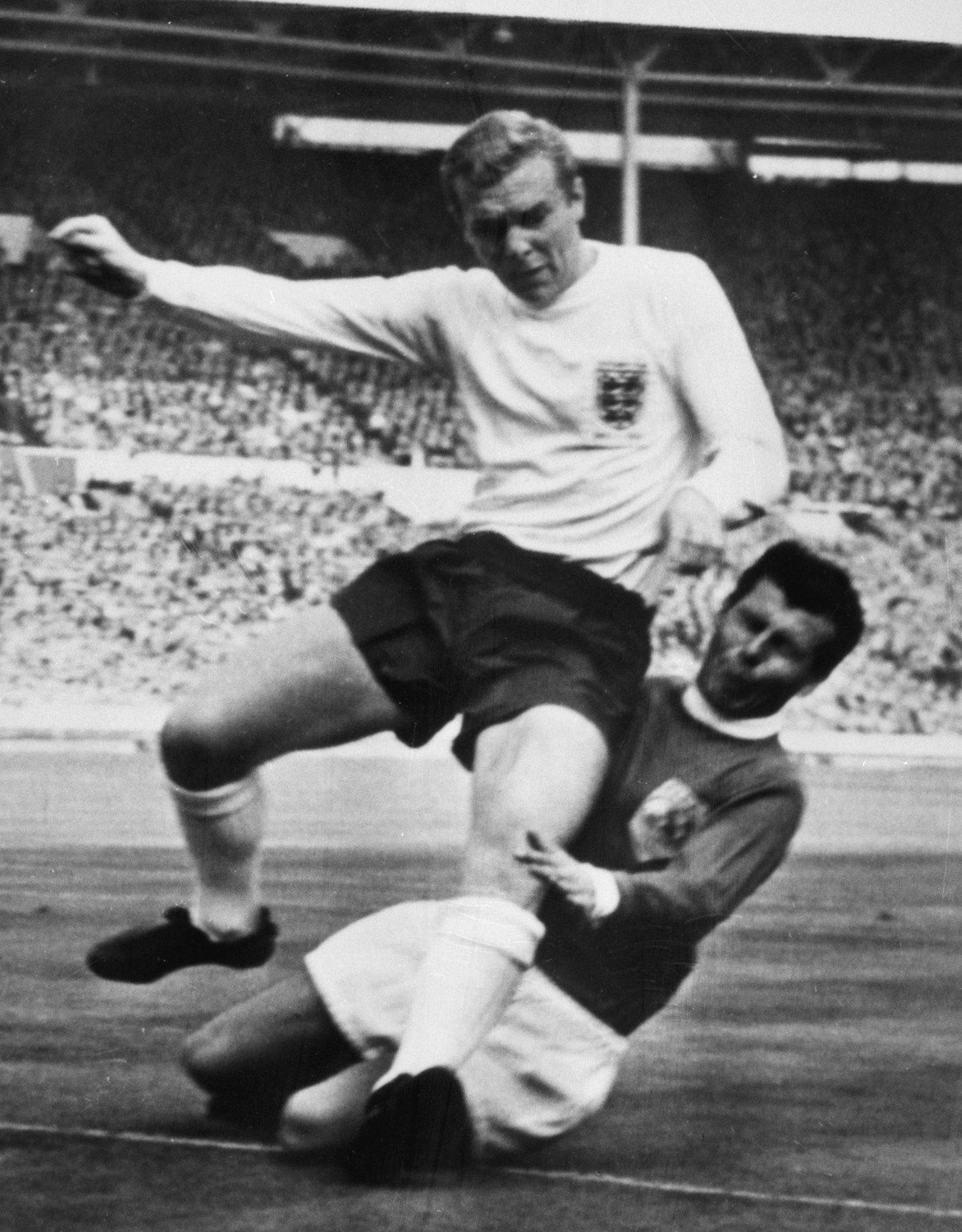
On 29 May 1963, aged 22, Moore captained his country for the first time in just his 12th appearance. This came after the retirement of Johnny Haynes and an injury to his successor, Jimmy Armfield, making him the youngest man ever to captain England at the highest level. England won the game against Czechoslovakia 4-2. Although Armfield initially returned to the captaincy, new coach Alf Ramsey permanently assigned the role to Moore during a series of summer friendlies in 1964. Moore scored his first England goal in a 1-1 draw with Poland in January 1966 at Goodison Park, and his second and final England goal in a friendly against Norway, two weeks before the World Cup began.
3.2. 1966 FIFA World Cup Victory
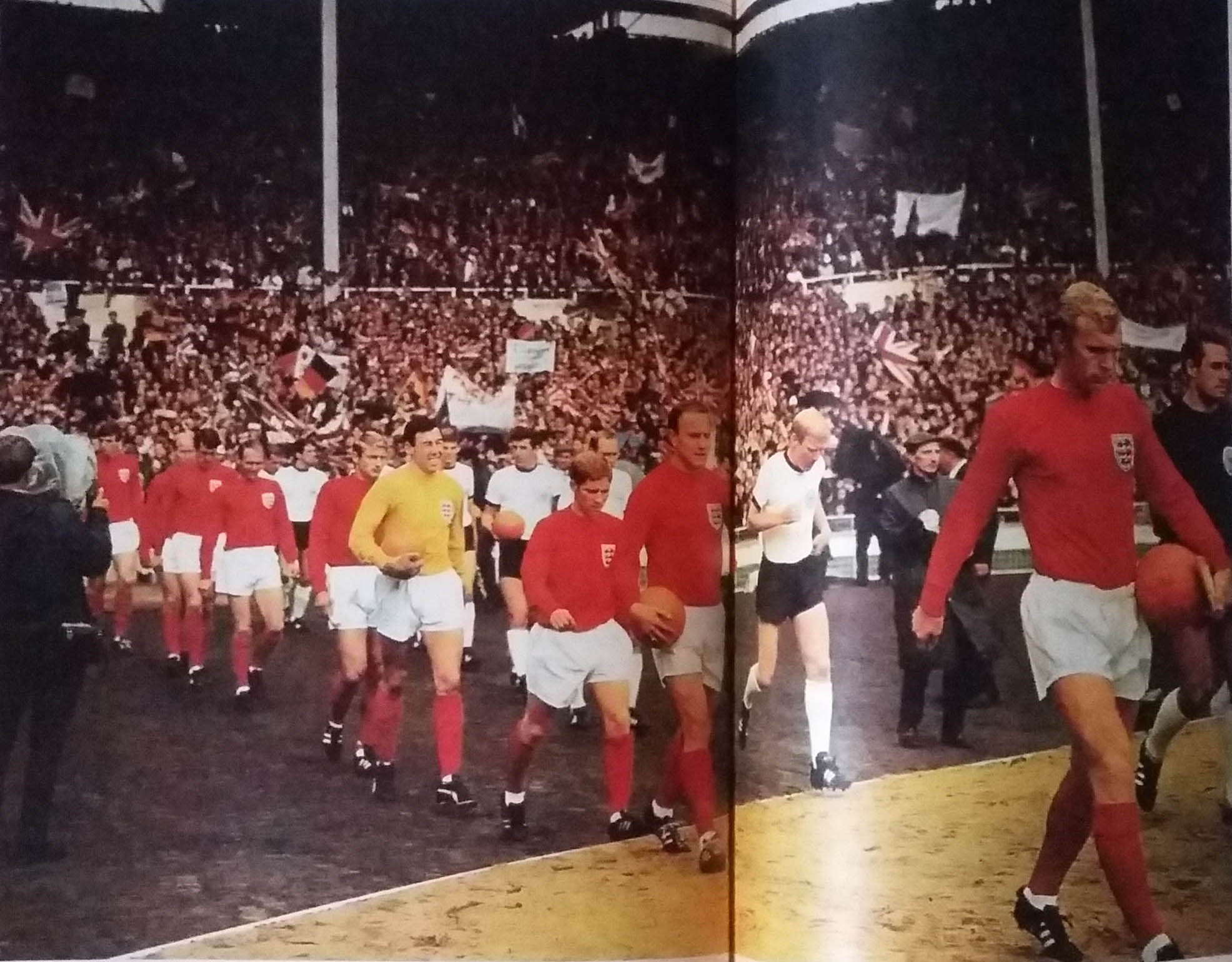
Leading the World Cup winning side, Moore established himself as a world-class player and sporting icon. Before the tournament, there were rumors that Moore wanted to leave West Ham due to a contract dispute. This was resolved after the intervention of Alf Ramsey and Ron Greenwood, ensuring Moore could captain the England team. England navigated their group stage with ease, playing all their games at Wembley. They then defeated Argentina in the quarter-finals and a Eusébio-led Portugal in the semi-finals, setting up a final clash against West Germany.
According to Geoff Hurst's autobiography, England full-back George Cohen overheard Ramsey discussing the possibility of dropping Moore for the final in favor of Norman Hunter. However, they ultimately decided to keep Moore as captain. Moore had not been playing poorly, nor did his contract dispute appear to be a distraction. The potential concerns were the speed of German attackers and Hunter's club partnership with Jack Charlton, Moore's co-defender.
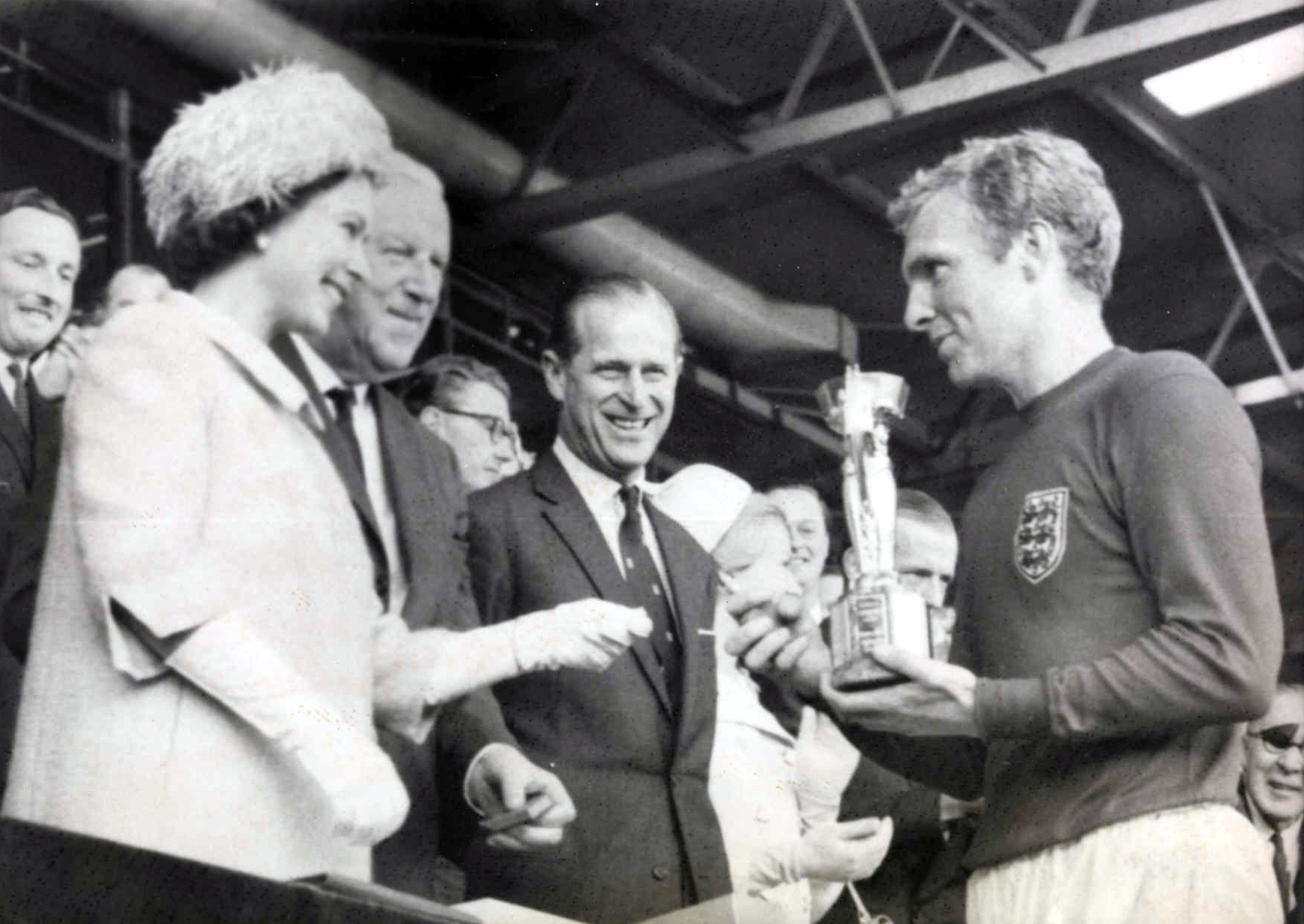
In the final, West Germany took an early lead through Helmut Haller. However, Moore's exceptional awareness and quick thinking led to England's swift equalizer. After being fouled by Wolfgang Overath in the German half, Moore quickly rose, looked upfield, and delivered an an instant free-kick onto Geoff Hurst's head, a move practiced at West Ham, which Hurst converted for the goal. The West Ham connection deepened when Martin Peters scored to put England 2-1 up. Yet, in the final minute of normal time, Wolfgang Weber equalized for Germany, as Moore's appeal for a handball went unheeded, sending the match into extra time.
Ramsey was confident the Germans were exhausted. After Hurst scored a controversial and heavily debated third goal, the game seemed decided. With seconds remaining and England under pressure from another German attack, the ball broke to Moore on the edge of his own penalty area. Despite teammates shouting for him to clear the ball, Moore calmly picked out Hurst upfield, who scored to seal a 4-2 victory and complete the only hat-trick in a World Cup final. One of the most enduring images from that day is Moore deliberately wiping his hands clean of mud and sweat on the velvet tablecloth before shaking the hand of Queen Elizabeth II as she presented him with the Jules Rimet trophy. The Guardian praised his composure, writing that "Moore is the calmest person in the stadium as he leads the England players up to the Royal Box."
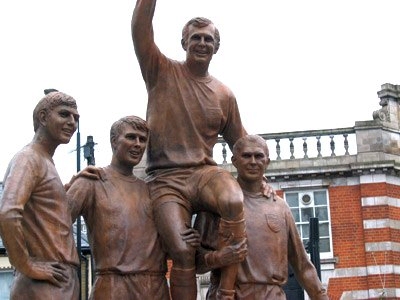
3.3. Post-World Cup Period and Final Caps
Moore became a national icon following England's World Cup success. He, along with Geoff Hurst and Martin Peters, took the World Cup trophy to various grounds West Ham visited during the subsequent domestic season. He was awarded the coveted BBC Sports Personality of the Year title at the end of 1966, becoming the first footballer to receive the honor and remaining the only one for 24 years. He also received an OBE in the New Year Honours List.
Moore continued to play for both West Ham and England. He earned his 50th cap in a 5-1 victory over Wales in late 1966, a match that also served as a qualifier for the 1968 European Football Championship. England eventually reached the semi-finals of the European Championships (which was a four-team event at the time) but lost 1-0 to Yugoslavia in Florence. As reigning champions, England did not need to qualify for the next World Cup, and Moore remained a key figure in Ramsey's team, earning his 78th cap before the squad departed for altitude acclimatization ahead of the 1970 finals in Mexico.
The year 1970 proved to be a bittersweet and eventful one for Moore. While retained as captain for the 1970 World Cup, pre-tournament preparations were severely disrupted by an attempt to implicate him in the theft of a bracelet from a jeweler in Bogotá, Colombia, where England were playing a warm-up game. A young assistant claimed Moore had taken the bracelet without paying. Though Moore had been in the shop with Bobby Charlton looking for a gift, no evidence supported the accusation. Moore was arrested and released, then traveled with the team to play Ecuador in Quito, earning his 80th cap in England's 2-0 victory. However, when the team plane stopped back in Colombia on its return to Mexico, Moore was detained and placed under four days of house arrest. Diplomatic pressure and the clear weakness of the evidence eventually led to the case being dropped entirely, and an exonerated Moore returned to Mexico to rejoin the squad, receiving a guard of honor from his teammates at the team hotel.
Moore played a pivotal role in England's progress through their World Cup group. On 2 June, he captained England to a 1-0 victory against Romania. In the second game against favorites Brazil, Moore produced a defining moment: a tackle on Jairzinho executed with such precision and cleanliness that it is widely considered the perfect tackle and continues to be replayed globally. Brazil still won the game 1-0, but England advanced through the group. Moore famously swapped shirts with Pelé after the game. A 1-0 win over Czechoslovakia allowed England to finish second in the group and move to the knockout stage. In the quarter-finals, a rematch of the 1966 World Cup final against West Germany, England took a 2-0 lead but ultimately lost 3-2 in extra time. At the end of the year, Moore was voted runner-up for the 1970 European Footballer of the Year award, behind West Germany's Gerd Müller.
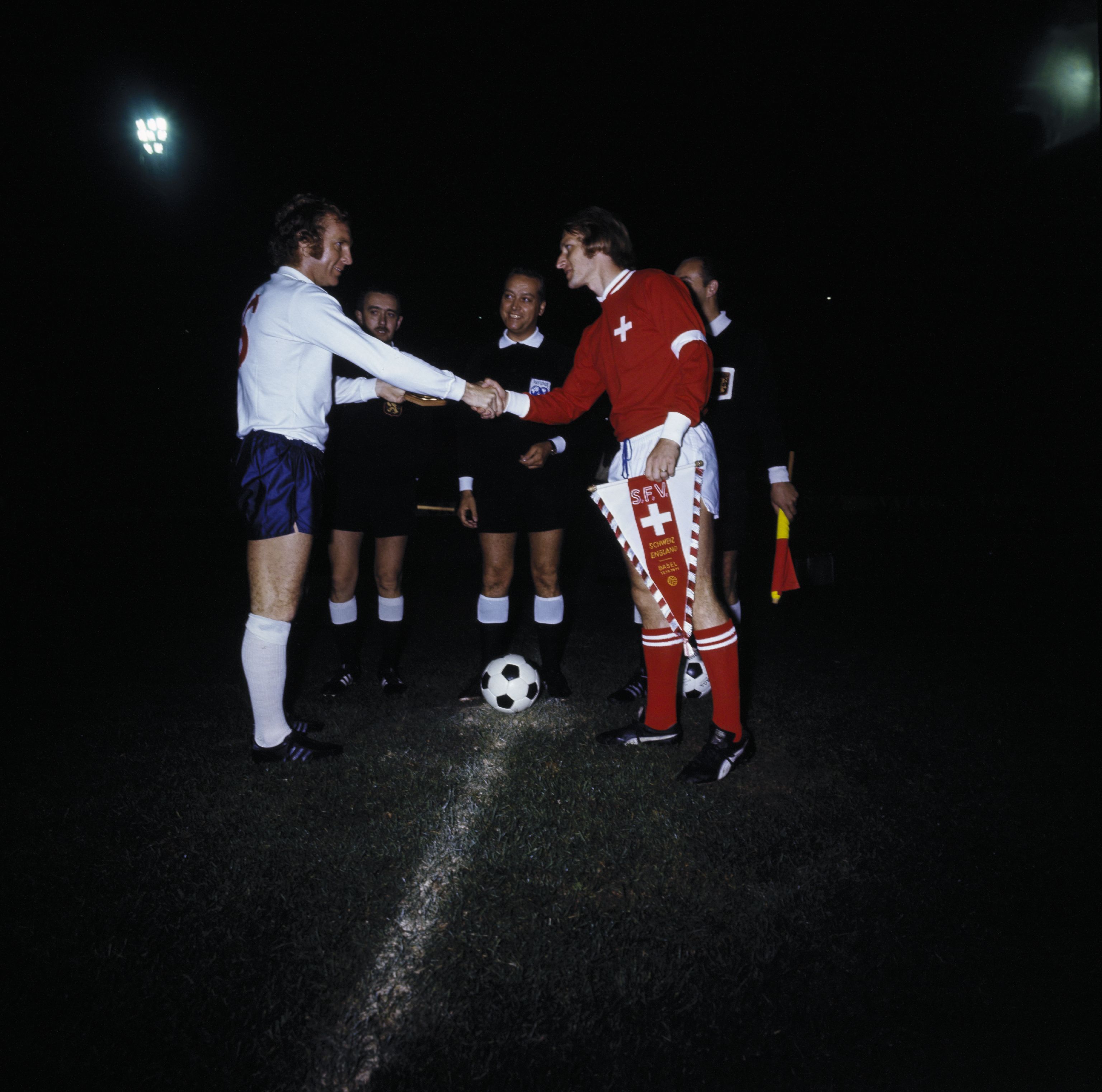
Despite his iconic status, Moore's final years at the top were marked by a dip in form and some controversies. On 10 August 1970, Moore received an anonymous threat to kidnap his wife for a 10.00 K GBP ransom, causing him to miss pre-season friendlies. On 7 January 1971, he and three West Ham teammates were fined by manager Greenwood for drinking in a nightclub before an FA Cup tie against Blackpool, which West Ham lost 4-0. This occurred on the night Moore was the subject of This Is Your Life. Football journalist Brian Glanville noted that Moore frequently drank heavily but would often train the next day, working off the alcohol. On 12 June 1972, he also made a guest appearance as captain for the Greek side Olympiacos in a friendly match against Brazilian club Corinthians.
On 14 February 1973, Moore earned his 100th cap for England in a dominant 5-0 victory over Scotland at Hampden Park. By this stage, only Martin Peters and Alan Ball from the 1966 squad remained in the England team alongside him. Later that year, Moore was exposed defensively in a crucial qualifier for the 1974 FIFA World Cup against Poland in Chorzów. He deflected a free kick past goalkeeper Peter Shilton for Poland's first goal and then lost possession to Wlodzimierz Lubanski, who scored the second. Moore's dipping form led manager Ramsey to not select him for the return game at Wembley, which England had to win to qualify. Moore was replaced by Norman Hunter in defense, and Peters took over as captain. Moore reportedly asked Ramsey if this meant he was no longer needed, to which Ramsey replied: "Of course not. I need you as my captain at the World Cup next year." England could only draw 1-1, failing to qualify for the World Cup. During the match, Hunter made an error similar to Moore's, leading to a Polish counterattack. Moore later recounted sitting on the bench, urging Ramsey to make a substitution, but Ramsey was hesitant. When Kevin Hector finally came on in the 85th minute, Moore was seen pulling down Hector's tracksuit bottoms, frustrated by the delay. England's failure to qualify for the 1974 FIFA World Cup ultimately led to Ramsey's dismissal six months later.
Moore won his 108th and final cap in the next game, a 1-0 friendly defeat to Italy on 14 November 1973. He became England's most capped player, surpassing Bobby Charlton's record by two appearances, and equaled Billy Wright's record of 90 appearances as captain. While Peter Shilton, David Beckham, and Steven Gerrard have since surpassed his caps record, Moore's joint captaincy record remains.
4. Managerial Career
Following his retirement as a professional player in 1978, Bobby Moore transitioned into management, holding coaching and managerial roles at various clubs.
Moore initially took up a coaching role at Crystal Palace. In 1980, he became the manager of Isthmian League side Oxford City, where he was assisted by his former West Ham teammate, Harry Redknapp. During his time at Oxford City, Moore significantly boosted the club's profile, attracting new media attention and signing notable players such as Phil Beal and John Fraser. Moore and Redknapp left Oxford City in 1981, with John Delaney succeeding them.
Following his departure from Oxford City, Moore moved to Hong Kong to manage Eastern, being appointed in August 1982 to replace Peter Wong. Moore had previously had a brief playing stint at Eastern, playing the final 12 minutes in their 4-0 Hong Kong Senior Challenge Shield victory against Hong Kong Rangers in December 1981. In January 1983, Moore bolstered the Eastern squad by recruiting Terry Cochrane and Alan Ball. Despite these new signings, Moore left the club in March 1983.
He then became manager of Southend United in 1984. In his first full season, 1984-85, Southend faced severe financial difficulties and narrowly avoided having to apply for re-election to the Football League. However, Moore gradually rebuilt the team, and in the 1985-86 season, Southend had a strong start, competing for promotion before eventually finishing ninth. His successor, David Webb, built upon this foundation to achieve promotion the following year. Moore agreed to serve on the club's board and held this position until his death.
5. Personal Life
Bobby Moore's personal life was marked by his family, some public controversies, and his post-retirement career endeavors.
Moore was a talented junior cricketer, serving as captain for the South of England schoolboys team and representing the Essex youth team, where he played alongside his long-term footballing teammate, Geoff Hurst. He met his first wife, Tina Dean, in 1957, and they married on 30 June 1962. They lived in a house in Chigwell, Essex, which they named "Morlands." Together, they had a daughter, Roberta, and a son, Dean. The couple separated in 1984 and divorced in 1986. Moore then began a relationship with Stephanie Parlane, who was eight years his junior, and they married on 4 December 1991.
Moore faced several controversies during his life, including two well-documented drink-driving incidents. On 12 April 1977, following his 36th birthday celebrations in Stratford, he was fined 150 GBP and banned from driving for 12 months. On 15 December 1983, he was arrested in Biggleswade, Bedfordshire, and subsequently banned from driving for three years and fined 175 GBP for a similar offense on 11 January 1984. Politically, Moore publicly supported Margaret Thatcher during the 1979 United Kingdom general election.
After retiring from playing, Moore became the Sports Editor for the Sunday Sport newspaper from 1986 to 1990. In 1990, he joined London radio station Capital Gold as a football analyst and commentator, a role he held until shortly before his death. Despite his iconic status as a player, Moore's life after football was often described as difficult, marked by poor business dealings and the dissolution of his first marriage. Many of his supporters felt that The Football Association could have offered him a more substantial role, such as an ambassadorial position, given his unique achievement as the only Englishman to captain a World Cup-winning team. Tragically, his son, Dean, died on 28 July 2011, at the age of 43, due to a medical condition and natural causes.
6. Illness and Death
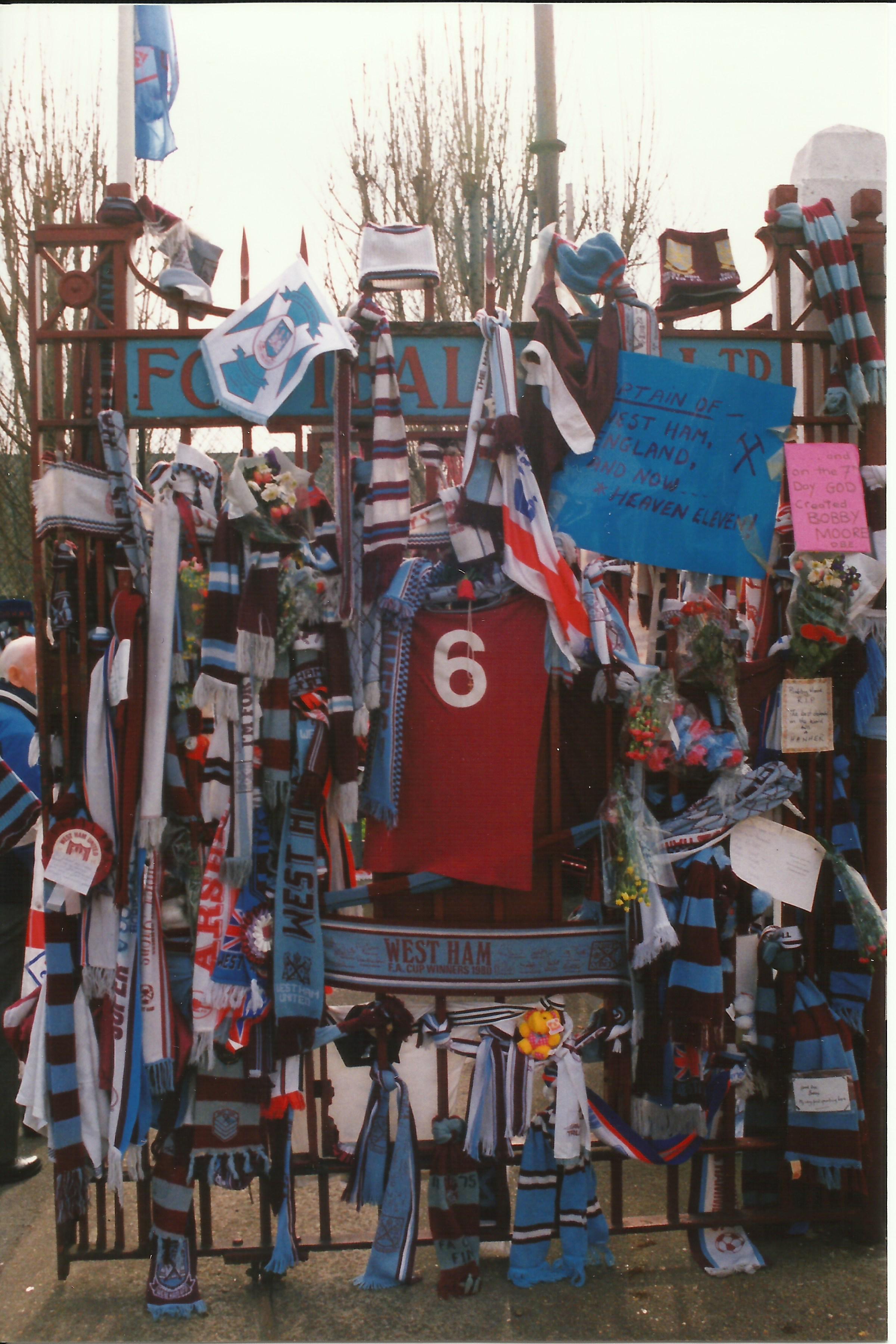
Bobby Moore's health struggles began in 1964, two years before England's World Cup victory, when he was diagnosed with testicular cancer. This was treated by the removal of one testis, and the cancer had not spread at that time. In April 1991, Moore underwent an operation for suspected colorectal cancer, which was publicly reported as an "emergency stomach operation."
On 14 February 1993, Moore publicly announced that he was suffering from colorectal cancer, which by then had spread to his liver. Just three days later, on 17 February, he made his final public appearance, commentating on an England match against San Marino at Wembley alongside his friend Jonathan Pearce. He also attended a dinner after the match and made a presentation. Seven days later, on 24 February 1993, Moore died at 6:36 AM, at the age of 51.
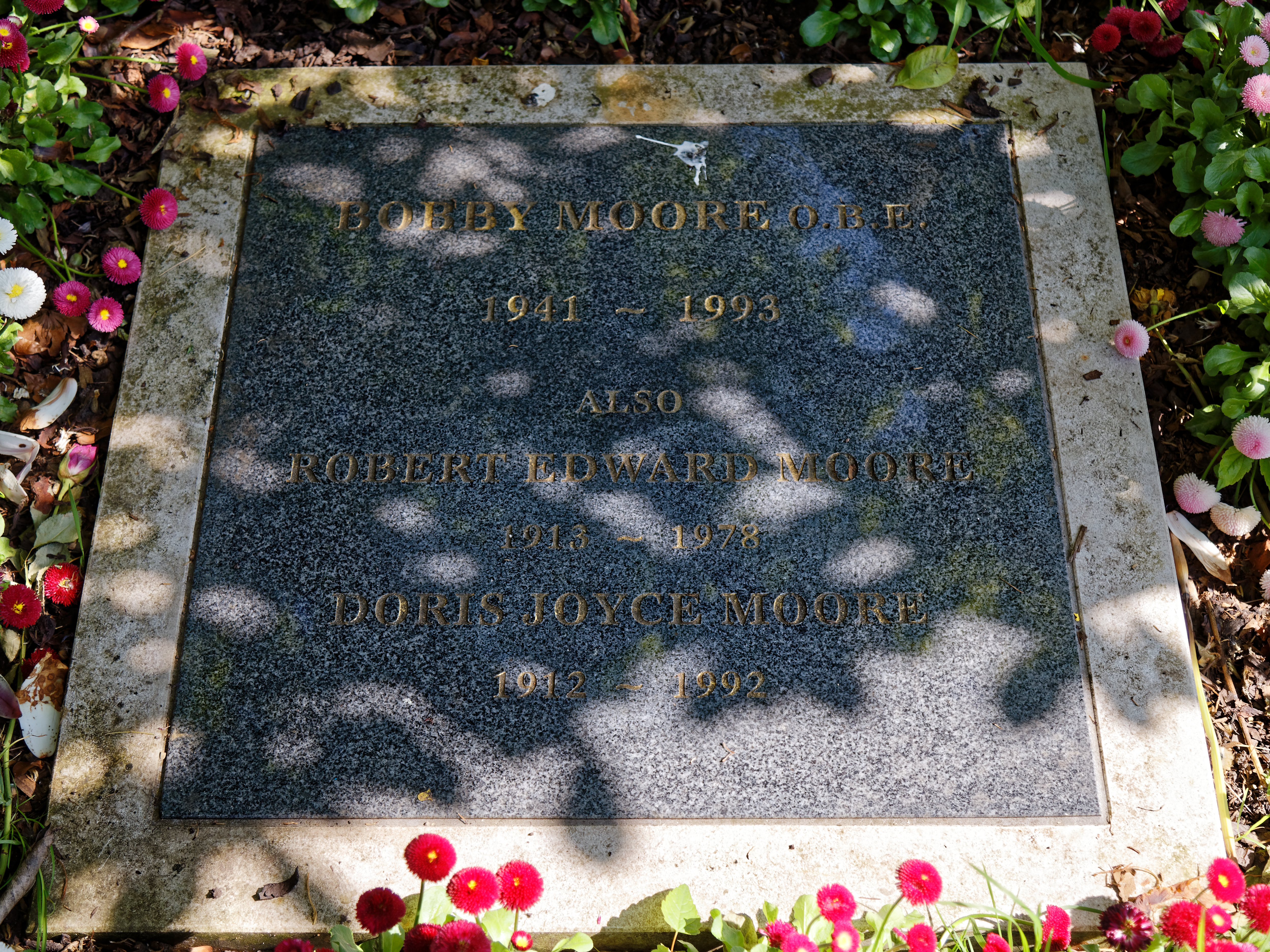
Moore was the first member of England's 1966 World Cup-winning team to pass away. His funeral was held on 2 March 1993 at Putney Vale crematorium, and his ashes were interred in the plot of his father, Robert Edward (died 1978), and his mother, Doris Joyce (died 1992) at the City of London Cemetery and Crematorium.
The first West Ham home game after his death, on 6 March 1993, against Wolverhampton Wanderers, saw a huge outpouring of grief and tribute at the Boleyn Ground. The stadium was adorned with floral tributes, scarves, and football memorabilia from fans of West Ham and other clubs alike. Fellow 1966 World Cup winners Geoff Hurst and Martin Peters placed a floral replica of a West Ham shirt, bearing Moore's number 6, on the center spot before the game. West Ham symbolically rested the No. 6 for the match, with regular No. 6, Ian Bishop, wearing No. 12. West Ham went on to win the game 3-1. His former England teammate, Jack Charlton, deeply affected by Moore's death, stated in a BBC documentary: "Well, I only ever cried over two people, Billy Bremner and Bob... He was a lovely man."
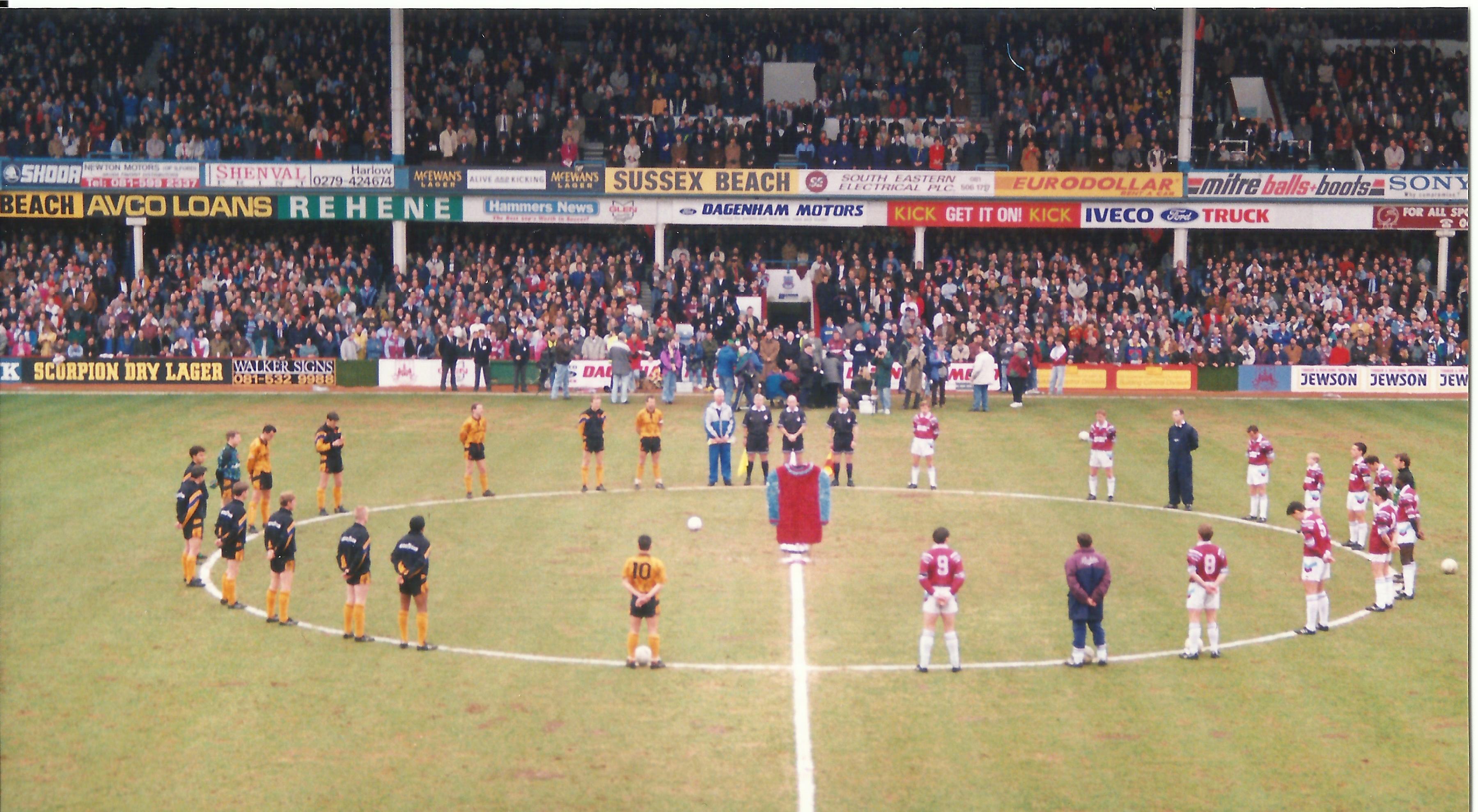
On 28 June 1993, a public service was held in Westminster Abbey to honor Moore's life. The service was attended by all the other members of the 1966 World Cup team, making him only the second sportsman to receive such an honor, the first being West Indies cricketer Sir Frank Worrell. The Dean of Westminster noted: "For many years he delighted supporters of West Ham and was a formidable opponent in the eyes of those against whom he played. But it is for his appearances for England-ninety of them as captain-that he will be chiefly remembered, and supremely for his captaincy of the World Cup team of 1966."
7. Legacy and Influence
Bobby Moore's legacy continues to resonate deeply within English football and society, cementing his symbolic importance and inspiring future generations.
7.1. Public Recognition and Honours
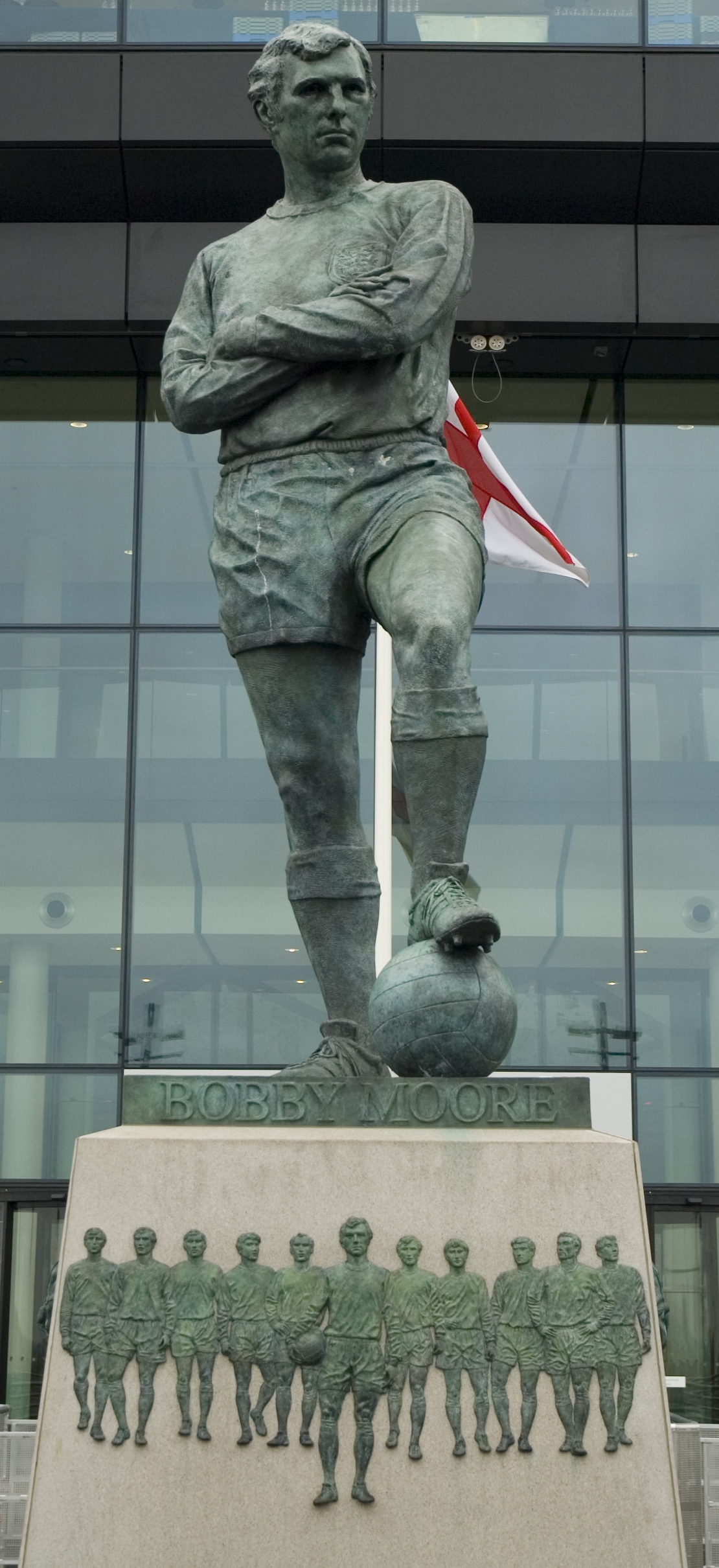
Moore received numerous accolades during and after his lifetime. He was awarded the BBC Sports Personality of the Year in 1966, becoming the first footballer to achieve this honor. In 1967, he was appointed an Officer of the Order of the British Empire. In 2002, he was an inaugural inductee into the English Football Hall of Fame, recognizing his immense impact on the English game. That same year, he was named in the BBC's list of the 100 Greatest Britons. In November 2003, as part of UEFA's Jubilee celebrations, he was selected as England's Golden Player by The Football Association, signifying him as the country's most outstanding player of the past 50 years. He was also honored posthumously with the FIFA Order of Merit in 1996 and was named to the World Team of the 20th Century in 1998, as well as the FIFA World Cup All-Time Team in 1994. In 2013, World Soccer magazine included him in their Greatest XI of All Time. In 2007, he was selected as the PFA Player of the Century and was also included in the PFA Team of the Century. More recently, in 2021, he was named to the IFFHS All-time Men's B Dream Team.
7.2. Memorials and Foundations
Following Moore's death, the Bobby Moore Fund was established in 1993 by his widow, Stephanie Moore, in collaboration with Cancer Research UK, to raise money for bowel cancer research and public awareness of the disease. By February 2013, the Fund had raised over 18.80 M GBP through campaigns like Make Bobby Proud.
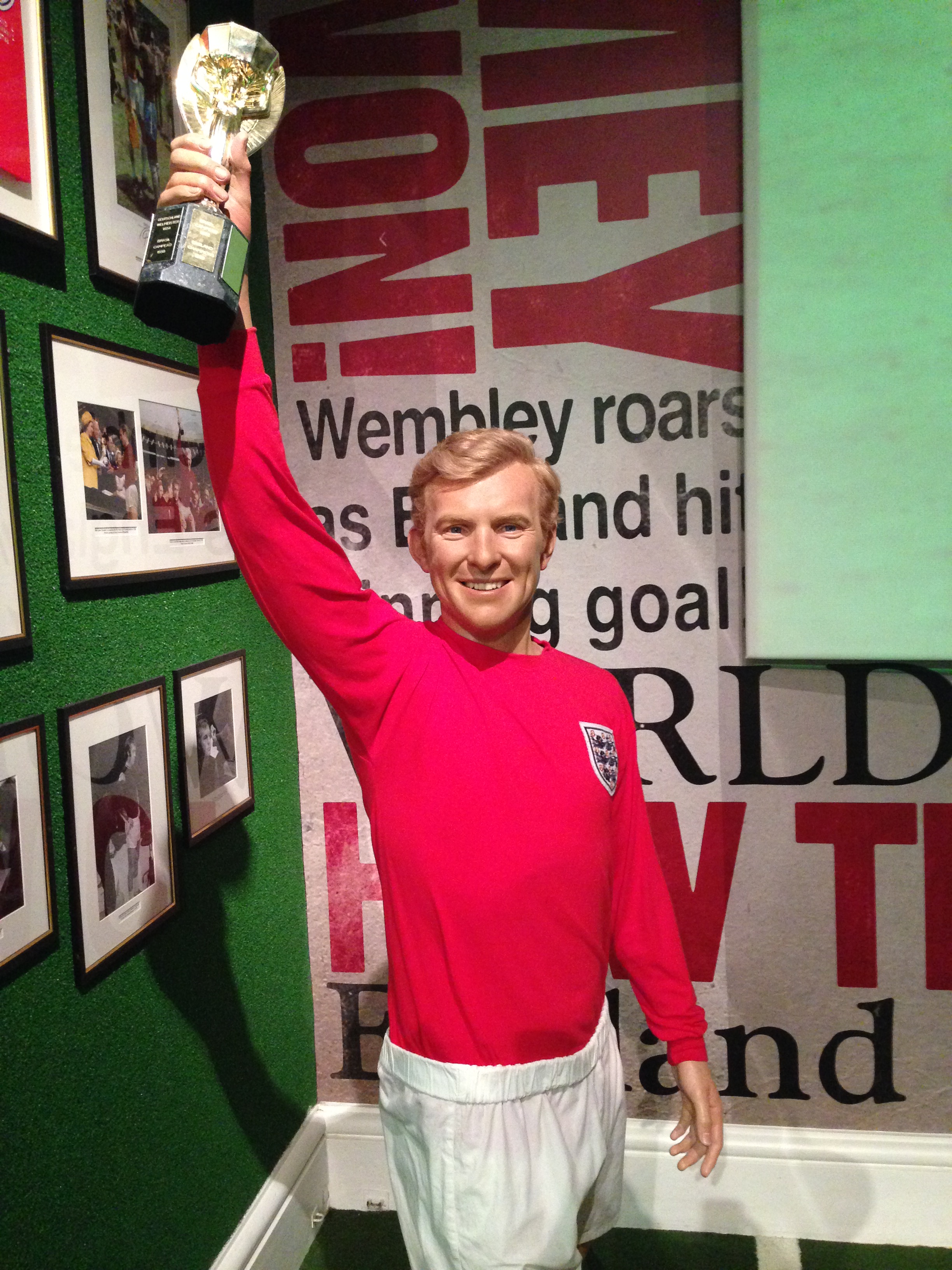
Various memorials have been dedicated to Moore. A bust of him stands in the entrance foyer of the stand bearing his name at West Ham's former ground, the Boleyn Ground. On 28 April 2003, Prince Andrew, as president of The Football Association, unveiled the World Cup Sculpture (also known as The Champions) near the Boleyn Ground. This one-and-a-half-size bronze statue, sculpted by Philip Jackson, depicts Moore holding the Jules Rimet Trophy aloft on the shoulders of Geoff Hurst and Ray Wilson, alongside Martin Peters, based on a famous photograph from after the 1966 final. The south bank at the Boleyn Ground was named the Bobby Moore Stand shortly after his death. When West Ham moved to the London Stadium in 2016, a stand at the north end of the new stadium was officially redesignated as the Bobby Moore Stand, opened by Moore's grandson, Frederick Moore-Hobbis.
On 11 May 2007, a two-times life-size bronze statue of Bobby Moore, also sculpted by Philip Jackson, was unveiled by Sir Bobby Charlton outside the newly reconstructed Wembley Stadium, looking down Wembley Way. In August 2008, West Ham United officially retired the number 6 shirt in his honor. On 26 July 2016, Moore became the first footballer to be honored with an English Heritage Blue Plaque outside his childhood home at 43 Waverley Gardens, Barking. In April 2017, the airline Norwegian announced that Moore's image would appear on the tail fin of one of their Boeing 737-800 aircraft as one of their "British tail fin heroes."
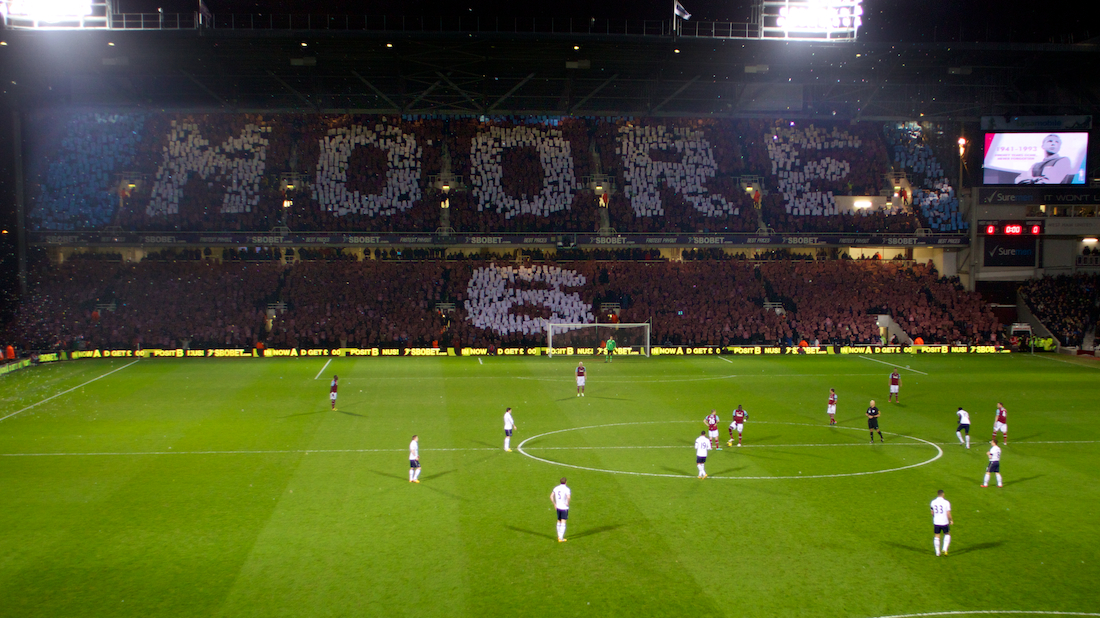
7.3. Cultural and Historical Impact
Moore's influence extends beyond football into popular culture and history. He appeared as Terry Brady in the 1981 film Escape to Victory, which also featured football legend Pelé and actor Sylvester Stallone. The film was a significant cultural event, especially in Japan, where many soccer enthusiasts flocked to see these footballing superstars on screen. Comedian Akashiya Sanma notably recalled going to the cinema specifically to see Moore. Moore also made cameo appearances as himself in several episodes of Till Death Us Do Part and its spin-off film The Alf Garnett Saga. His name can also be spotted written on a Volkswagen bus in the 1969 film The Italian Job.
His iconic tackle on Jairzinho in the 1970 World Cup match against Brazil was immortalized in the lyrics of the 1996 England team song "Three Lions" by comedians Frank Skinner and David Baddiel, which became an anthem for England fans. Moore's status as an icon has also translated to modern media, with his inclusion as an "icon" player in EA Sports' FIFA 19 video game in 2018. Further commemorating his legacy, the Bobby Moore Academy primary and secondary schools were established in 2017 within the Queen Elizabeth Olympic Park in Newham, near the London Stadium, providing education for up to 1,500 students and maintaining links with West Ham United.
8. Criticism and Controversies
Despite his celebrated public image, Bobby Moore's career and personal life were not without their share of controversies and challenges.
One of the most notable incidents occurred in 1970, when Moore was involved in the "Bogotá bracelet" incident. While training in Colombia for the 1970 FIFA World Cup, he was accused of stealing an emerald bracelet from a jewelry shop in Bogotá. He was arrested and subjected to a four-day house arrest. Although he was eventually exonerated and the case dropped due to insufficient evidence, some sources suggest this was a politically motivated fabrication amidst trade friction between South American and European nations. The incident caused significant disruption to England's World Cup preparations.
Another public controversy involved a nightclub incident in January 1971. Moore, along with West Ham teammates Jimmy Greaves, Brian Dear, and Clyde Best, was fined a week's wages by manager Ron Greenwood after they were found drinking in a nightclub until the early hours of the morning before an FA Cup third-round tie against Blackpool. West Ham subsequently lost the match 4-0. This event, which occurred on the eve of a television special about Moore's life, highlighted instances of heavy drinking, though it was noted that Moore often trained rigorously the next day to work off the alcohol.
Moore also faced legal issues related to drink-driving. On 12 April 1977, following his 36th birthday celebrations, he was fined 150 GBP and banned from driving for 12 months. He faced further legal trouble on 15 December 1983 when he was arrested in Biggleswade and subsequently banned from driving for three years and fined 175 GBP in January 1984 for another drink-driving offense.
In his post-retirement life, Moore experienced considerable difficulties, including poor business dealings that led to financial struggles and the breakdown of his first marriage. Many of his supporters lamented what they perceived as a lack of recognition or a fitting role from The Football Association for the only Englishman to captain a World Cup-winning team, feeling that he was not adequately supported or offered an ambassadorial position that would have leveraged his iconic status.
9. Career Statistics
9.1. Club
| Club | Season | League | FA Cup | League Cup | Other | Total | ||||||
|---|---|---|---|---|---|---|---|---|---|---|---|---|
| Division | Apps | Goals | Apps | Goals | Apps | Goals | Apps | Goals | Apps | Goals | ||
| West Ham United | 1958-59 | First Division | 5 | 0 | 0 | 0 | 0 | 0 | 1 | 0 | 6 | 0 |
| 1959-60 | 13 | 0 | 0 | 0 | 0 | 0 | 2 | 0 | 15 | 0 | ||
| 1960-61 | 38 | 1 | 2 | 0 | 2 | 1 | - | 42 | 2 | |||
| 1961-62 | 41 | 3 | 1 | 0 | 2 | 0 | - | 44 | 3 | |||
| 1962-63 | 41 | 3 | 5 | 0 | 1 | 0 | - | 47 | 3 | |||
| 1963-64 | 37 | 2 | 7 | 0 | 6 | 0 | - | 50 | 2 | |||
| 1964-65 | 28 | 1 | 0 | 0 | 0 | 0 | 8 | 0 | 35 | 1 | ||
| 1965-66 | 37 | 0 | 4 | 0 | 9 | 2 | 6 | 0 | 56 | 2 | ||
| 1966-67 | 40 | 2 | 2 | 0 | 6 | 0 | - | 48 | 2 | |||
| 1967-68 | 40 | 4 | 3 | 0 | 3 | 0 | - | 46 | 4 | |||
| 1968-69 | 41 | 2 | 3 | 0 | 3 | 0 | - | 47 | 2 | |||
| 1969-70 | 40 | 0 | 1 | 0 | 2 | 0 | - | 43 | 0 | |||
| 1970-71 | 39 | 2 | 1 | 0 | 2 | 0 | - | 42 | 2 | |||
| 1971-72 | 40 | 1 | 4 | 0 | 10 | 0 | - | 54 | 1 | |||
| 1972-73 | 42 | 3 | 2 | 0 | 2 | 0 | - | 46 | 3 | |||
| 1973-74 | 22 | 0 | 1 | 0 | 1 | 0 | 1 | 0 | 24 | 0 | ||
| Total | 544 | 24 | 36 | 0 | 49 | 3 | 18 | 0 | 647 | 27 | ||
| Fulham | 1973-74 | Second Division | 10 | 1 | - | - | - | 10 | 1 | |||
| 1974-75 | 41 | 0 | 12 | 0 | 3 | 0 | - | 54 | 0 | |||
| 1975-76 | 33 | 0 | 1 | 0 | 3 | 0 | - | 37 | 0 | |||
| 1976-77 | 40 | 0 | 2 | 0 | 5 | 0 | - | 47 | 0 | |||
| Total | 124 | 1 | 15 | 0 | 11 | 0 | - | 148 | 1 | |||
| San Antonio Thunder | 1976 | NASL | 24 | 1 | - | - | - | 24 | 1 | |||
| Seattle Sounders | 1978 | NASL | 7 | 0 | - | - | - | 7 | 0 | |||
| Herning Fremad | 1978 | |||||||||||
| 9 | 0 | - | - | - | 9 | 0 | ||||||
| Carolina Lightnin' | 1983 | |||||||||||
| 8 | 0 | - | - | - | 8 | 0 | ||||||
| Career total | 716 | 26 | 51 | 0 | 60 | 3 | 18 | 0 | 843 | 29 | ||
9.2. International
| National team | Year | Apps | Goals |
|---|---|---|---|
| England | 1962 | 8 | 0 |
| 1963 | 9 | 0 | |
| 1964 | 9 | 0 | |
| 1965 | 9 | 0 | |
| 1966 | 15 | 2 | |
| 1967 | 6 | 0 | |
| 1968 | 9 | 0 | |
| 1969 | 9 | 0 | |
| 1970 | 11 | 0 | |
| 1971 | 7 | 0 | |
| 1972 | 6 | 0 | |
| 1973 | 10 | 0 | |
| Total | 108 | 2 | |
:Scores and results list England's goal tally first, score column indicates score after each Moore goal.
| No. | Date | Venue | Opponent | Score | Result | Competition |
|---|---|---|---|---|---|---|
| 1 | 5 January 1966 | Goodison Park, Liverpool, England | Poland | 1-1 | 1-1 | Friendly |
| 2 | 29 June 1966 | Ullevaal Stadion, Oslo, Norway | Norway | 4-1 | 6-1 | Friendly |
10. Honours
10.1. Player
West Ham United
- FA Cup: 1963-64
- FA Charity Shield: 1964
- UEFA Cup Winners' Cup: 1964-65
Fulham
- FA Cup runner-up: 1974-75
Eastern
- Hong Kong Senior Challenge Shield: 1981-82
England
- FIFA World Cup: 1966
- UEFA Euro third place: 1968
- British Home Championship:
- Winners: 1964-65, 1965-66, 1967-68, 1968-69, 1970-71, 1972-73
- Shared: 1963-64, 1969-70, 1971-72
10.2. Individual
- Ballon d'Or runner-up: 1970
- FWA Footballer of the Year: 1964
- West Ham Player of the Year: 1961, 1963, 1968, 1970
- FUWO European Team of the Year: 1965, 1966, 1967, 1969, 1970, 1972
- FIFA World Cup All-Star Team: 1966
- BBC Sports Personality of the Year: 1966
- Officer of the Order of the British Empire: 1967
- UEFA Euro Team of the Tournament: 1968
- World Soccer World XI: 1968, 1969, 1971, 1972, 1973
- Rothmans Golden Boots Awards: 1970, 1971, 1972, 1973
- Sport Ideal European XI: 1971, 1972
- Inducted into the English Football Hall of Fame: 2002
- UEFA Jubilee Awards - Greatest English Footballer of the last 50 Years (Golden Player): 2003
- FIFA World Cup All-Time Team: 1994
- FIFA Order of Merit: 1996
- World Team of the 20th Century: 1998
- Number 6 retired by West Ham: 2008 (posthumous)
- World Soccer Greatest XI of All Time: 2013
- 100 Greatest Britons: 2002
- Football League 100 Legends
- IFFHS All-time Men's B Dream Team: 2021